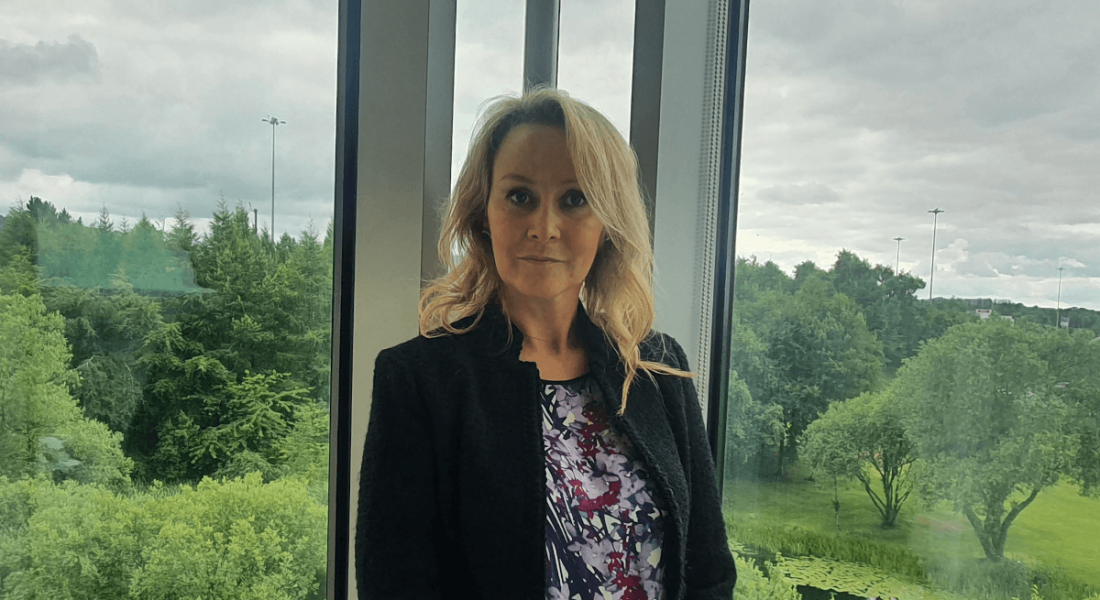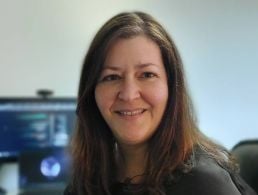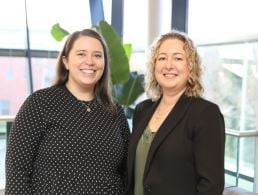Fidelity Investments’ Fiona Veazey talks about the constant learning curves within data analytics as well as the many different career paths available.
Fiona Veazey is a senior technology manager in data analytics, AI and machine learning (ML) at Fidelity Investments.
In her role, she leads, manages and coach associates across several data analytics and AI/ML teams working on a variety of projects from anomaly detection and autonomous processing to predictive quality control, as well as the development of an advanced analytics platform and strategic enterprise data lake build-out.
She has been with Fidelity Investments for 15 years, having started on a quantitative analytics team with the company’s Boston office.
“I worked as a software engineer for a year or so supporting the technology side of asset management until an opportunity was presented to me to head up what was described to me as a ‘SWAT’ team designed to serve time critical tactical analytic needs on the trading floor for portfolio managers, financial analysts, trading and quantitative analytics teams,” she said.
“In 2015, my fiancée and I decided to move to Ireland as I wanted to be closer to family. Luckily Fidelity Ireland was expanding its asset management division at the time, and so Fidelity relocated me back to Ireland where I worked with Asset Management Operations for a while before moving to my current role.”
‘The power of data has never been more apparent’
– FIONA VEAZEY
What first stirred your interest in a career in analytics?
I found my way into this career by a twist of fate really. I spent my young life in a career as a showjumper, competing for Ireland on several occasions. While I enjoyed the glamorous side to the sport, I also felt it would be wise to have an education to support what I had intended to be a back-up career.
Computers had always interested me, so I embarked on a computer science degree. While pursuing my education, I was extremely fortunate to have the opportunity to work as a computer programmer for Fexco, which enabled me gain valuable experience and better afford my education.
Over the course of my education and my time with Fexco, I found I really enjoyed what I was doing, had an aptitude for it and so I began to think more and more about a dedicated career in IT.
What were the biggest surprises you encountered on your career path in analytics?
When I started working on the trading floor directly for investment professionals, I faced a steep learning curve on a few fronts in terms of business knowledge and relationship management.
I learned quickly that it’s not enough just to be proficient in analytics. It was equally important to understand the business of portfolio management, performance and risk analysis and, of course, the go-to tools used such as FactSet, BarraOne and Bloomberg, and how to use them as the investment professionals would as well as being able to programmatically interface with them.
Knowing the ins and outs of how portfolios are managed, traded, assessed and so on, gave me the ability to understand the analytics, proactively spot anomalies and ultimately understand and predict better the needs of the people I worked with. Learning the business was daunting, but it was just a matter of rolling up the sleeves and getting on with it.
Similarly, I am tackling a learning curve again now in the AI/ML space, however, I am getting stuck in and am thoroughly enjoying learning all about it. AI/ML is an extremely exciting area and there is no doubt it’s set to become more and more central to business and life in general.
There are times when it seems that the more I learn, the more I realise there is to learn. However, I think you must be able to embrace that and forge ahead. I do enjoy a challenge and am hungry to learn so I am doing everything I can now to increase my knowledge as quickly as I can.
Was there any one person who was particularly influential as your career developed?
There are many to be honest. However, I would have to say the biggest influence in my career development was Chuck McDevitt, who was head of international operations at Fidelity Institutional Asset Management.
Chuck put me into the role on the trading floor, which was the pivotal point in my career where I switched from being purely a software developer into a more analytical role. He believed in me and trusted that I would do what it took to make it work.
That responsibility entrusted on me gave me confidence, further increased my drive to succeed and showed me that with enough resilience and tenacity, great things are possible.
This experience also influenced my leadership style as I get great satisfaction from watching associates thrive, in giving people opportunities and in looking for talent where it might not be immediately evident and fostering it to help it emerge.
In Fidelity Ireland as well, I have had the good fortune to be guided by management as Tony Sheridan, Carol Twomey, Stephanie Pearson and others all played a role in me getting into AI/ML opportunities.
What do you enjoy most about your job?
It’s a fascinating time to be in analytics, especially now with the explosion of AI/ML not just into our organisations and businesses but into almost every facet of our everyday lives too.
It’s also an exciting time work in Fidelity as it undergoes a huge digital transformation that will impact how the organisation does business and services our customers for years to come. Data and analytics play a huge part in all of this.
More specifically though, turning raw data in to meaningful insights to facilitate and enhance business process, empower decisions, streamline processes, and improve associate experience and customer service is very powerful. Especially now with the increasing popularity of AI/ML, the power of data has never been more apparent, and it’s amazes me to see what can be done with AI and how it has integrated itself into our lives.
What aspects of your personality do you feel make you suited to analytics?
Detail-oriented, methodical, resilient, determined and tenacious are all words I have often heard others use to describe me.
Having grown up in a hardworking family and being involved in sport from a very young age, those qualities were instilled in me by experience. I have learned that it takes effort, grit and commitment to accomplish big things. Talent is something people are born with, but talent by itself isn’t enough. It still must be nurtured and trained, be that in sport or business.
No one is born an expert, we all have to start somewhere. And while no one likes to fail or struggle, I think it’s important to realise that it’s a part of growth and development and one shouldn’t shy away from taking intelligent calculated risks and keep going. I guess that takes an element of bravery, so maybe I should add that to the list too!
What can people expect from career progression in the analytics industry?
With a career in analytics there are many avenues one can take to progress their career. As I mentioned earlier, it’s important to develop communication and soft skills alongside the tech skills.
Analysts can dive deeper into analytics, move to a squad lead or product owner role, or go the chapter leadership or people management route, for example. Being well rounded lends itself to being able to apply oneself to really anything, in my opinion.
Fidelity places a high value on associate development, has a strong learning culture and really puts into practice the idea of developing talent, career mobility and promotion from within where possible.
There is a dedicated learning day every two weeks that associates are encouraged to use for their self-development, study for professional certifications or learn more about the business. Just recently, for example, I was able to participate in an AI/ML-related Harvard Business School course that Fidelity financed.
What advice would you give to those considering a career in analytics?
My advice would be that to be to consider your strengths. Are you analytical by nature, are you curious, do you love data and the idea of gleaning insight from data, do you enjoy learning and staying current in the latest techniques, tools, technologies, etc?
If so, you will likely thrive and enjoy this career. Analytics is an interesting field that can lead to so many exciting opportunities if you are interested in pursuing it – I certainly recommend it.
Also, keep in mind the principle in this quote attributed to Roman philosopher Seneca: “Luck is what happens when preparation meets opportunity.” I am a firm believer in this, so, be prepared, communicate what you want, commit to lifelong learning to stay current, work for it and be ready to jump when the opportunity comes.
10 things you need to know direct to your inbox every weekday. Sign up for the Daily Brief, Silicon Republic’s digest of essential sci-tech news.




